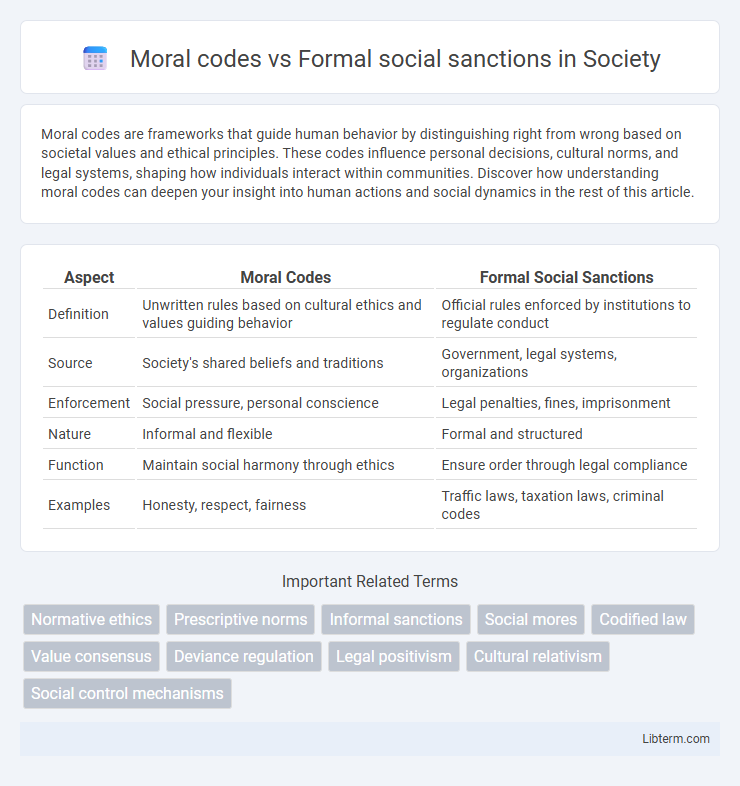Moral codes are frameworks that guide human behavior by distinguishing right from wrong based on societal values and ethical principles. These codes influence personal decisions, cultural norms, and legal systems, shaping how individuals interact within communities. Discover how understanding moral codes can deepen your insight into human actions and social dynamics in the rest of this article.
Table of Comparison
| Aspect | Moral Codes | Formal Social Sanctions |
|---|---|---|
| Definition | Unwritten rules based on cultural ethics and values guiding behavior | Official rules enforced by institutions to regulate conduct |
| Source | Society's shared beliefs and traditions | Government, legal systems, organizations |
| Enforcement | Social pressure, personal conscience | Legal penalties, fines, imprisonment |
| Nature | Informal and flexible | Formal and structured |
| Function | Maintain social harmony through ethics | Ensure order through legal compliance |
| Examples | Honesty, respect, fairness | Traffic laws, taxation laws, criminal codes |
Understanding Moral Codes: Definition and Nature
Moral codes consist of unwritten principles that govern individual behavior based on societal values and ethical beliefs, often internalized through socialization and cultural norms. Unlike formal social sanctions, which are explicit rules enforced by institutions like law enforcement or regulatory bodies, moral codes rely on internal conscience and communal consensus to guide actions. These moral frameworks shape judgment and accountability without requiring formal adjudication or codified penalties.
Formal Social Sanctions: What Are They?
Formal social sanctions are official responses imposed by institutions to enforce norms and laws within a society. These sanctions include penalties such as fines, imprisonment, or formal reprimands that ensure compliance with established rules. They play a critical role in maintaining social order by deterring deviant behavior through clear, codified consequences.
Origins of Moral Codes in Society
Moral codes originate from shared cultural values and collective experiences that guide individual behavior within societies, often rooted in religious beliefs, traditions, and communal consensus. These codes predate formal social sanctions, which are institutionalized rules and legal systems designed to enforce societal norms through penalties or rewards. Understanding the origins of moral codes reveals their foundational role in establishing informal social control before the development of formal sanctions.
The Mechanisms Behind Formal Social Sanctions
Formal social sanctions operate through institutional mechanisms such as legal systems, regulations, and organizational policies that enforce societal norms and rules. These sanctions rely on codified statutes and authoritative bodies to administer penalties like fines, imprisonment, or suspension, ensuring compliance and maintaining social order. The effectiveness of formal social sanctions depends on the clarity of laws, consistency of enforcement, and legitimacy of the institutions involved.
Key Differences Between Moral Codes and Formal Sanctions
Moral codes are informal, culturally embedded principles guiding individual behavior through internalized notions of right and wrong, while formal social sanctions are explicit, institutionalized rules enforced by authorities to regulate conduct. Moral codes rely on social consensus and personal conscience for compliance, whereas formal sanctions involve legal consequences, such as fines or imprisonment, for violations. The key difference lies in their enforcement mechanisms: moral codes depend on social approval and guilt, whereas formal sanctions utilize official power and coercion.
The Role of Social Institutions in Enforcing Formal Sanctions
Social institutions such as the legal system, government agencies, and educational organizations play a pivotal role in enforcing formal social sanctions by establishing codified laws and regulations. These institutions ensure compliance through structured penalties, including fines, imprisonment, and social service mandates, which reinforce societal norms and maintain order. The effectiveness of formal sanctions relies on systematic monitoring, judicial processes, and institutional authority to uphold collective morality and deter deviant behavior.
How Moral Codes Influence Individual Behavior
Moral codes shape individual behavior by internalizing ethical principles that guide decision-making and social interactions, fostering a sense of personal responsibility and conscience. These unwritten rules influence actions even in the absence of external enforcement, promoting adherence through guilt, pride, or social approval. Unlike formal social sanctions imposed by institutions, moral codes operate through intrinsic motivation and cultural norms, creating a self-regulating framework for behavior.
Interplay Between Moral Values and Legal Sanctions
Moral codes, rooted in cultural and ethical values, shape individual behavior by defining what is considered right or wrong, while formal social sanctions enforce compliance through legal penalties and institutional authority. The interplay between moral values and legal sanctions reveals how laws often reflect underlying societal morals but also adapt to changing ethical standards to maintain social order. Conflicts arise when formal sanctions fail to align with prevailing moral beliefs, highlighting the dynamic relationship between collective conscience and legal frameworks.
Case Studies: When Moral Codes and Formal Sanctions Collide
Case studies such as the Stanford Prison Experiment reveal the tension between moral codes and formal social sanctions when institutional rules clash with personal ethics. In the trial of whistleblowers like Edward Snowden, formal legal penalties conflict sharply with widespread public moral support, highlighting the complex interplay between legality and morality in governance. The Brown v. Board of Education case illustrates how formal social sanctions enforcing segregation were challenged and ultimately transformed by evolving moral codes advocating racial equality.
Implications for Social Harmony and Policy Development
Moral codes, rooted in shared values and ethical beliefs, foster intrinsic motivation for maintaining social harmony by guiding individual behavior through internalized norms. Formal social sanctions, enforced by legal or institutional mechanisms, provide extrinsic accountability that deters deviant actions and supports social order. Effective policy development integrates moral principles with formal sanctions to create balanced approaches that promote compliance, reinforce community cohesion, and enhance overall societal stability.
Moral codes Infographic

 libterm.com
libterm.com